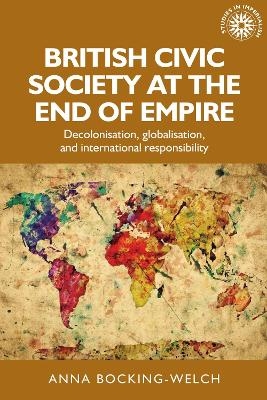
British Civic Society at the End of Empire
Decolonisation, Globalisation, and International Responsibility
Seiten
2018
Manchester University Press (Verlag)
978-1-5261-3127-0 (ISBN)
Manchester University Press (Verlag)
978-1-5261-3127-0 (ISBN)
The end of the empire and the legacies of Britain’s imperial past have shaped how the British public interact with the outside world. This book shows how the international activities of civic associations in the 1960s can help us to understand the impact of decolonisation on the British public’s sense of international responsibility. -- .
This book is about the impact of decolonisation on British civic society in the 1960s. It shows how participants in middle class associational life developed optimistic visions for a post-imperial global role. Through the pursuit of international friendship, through educational efforts to know and understand the world, and through the provision of assistance to those in need, the British public imagined themselves as important actors on a global stage. As this book shows, the imperial past remained an important repository of skill, experience, and expertise in the 1960s, one that was called upon by a wide range of associations to justify their developing practices of international engagement. This book will be useful to scholars of modern British history, particularly those with interests in empire, internationalism, and civil society. The book is also designed to be accessible to undergraduates studying these areas. -- .
This book is about the impact of decolonisation on British civic society in the 1960s. It shows how participants in middle class associational life developed optimistic visions for a post-imperial global role. Through the pursuit of international friendship, through educational efforts to know and understand the world, and through the provision of assistance to those in need, the British public imagined themselves as important actors on a global stage. As this book shows, the imperial past remained an important repository of skill, experience, and expertise in the 1960s, one that was called upon by a wide range of associations to justify their developing practices of international engagement. This book will be useful to scholars of modern British history, particularly those with interests in empire, internationalism, and civil society. The book is also designed to be accessible to undergraduates studying these areas. -- .
Anna Bocking-Welch is Lecturer in British and Imperial History at the University of Liverpool -- .
Introduction
1 Imperial lives and Commonwealth visions
2 International mobility and the pursuit of informed understanding
3 Friendship, hospitality, and the hierarchies of affective international relationships
4 Philanthropic connections and Britain’s ‘lost vocation’
5 Christian responsibility in a shrinking world
Conclusion
Index -- .
| Erscheinungsdatum | 16.01.2019 |
|---|---|
| Reihe/Serie | Studies in Imperialism |
| Verlagsort | Manchester |
| Sprache | englisch |
| Maße | 156 x 234 mm |
| Gewicht | 481 g |
| Themenwelt | Geisteswissenschaften ► Geschichte ► Regional- / Ländergeschichte |
| Geschichte ► Teilgebiete der Geschichte ► Kulturgeschichte | |
| Geschichte ► Teilgebiete der Geschichte ► Sozialgeschichte | |
| Geschichte ► Teilgebiete der Geschichte ► Wirtschaftsgeschichte | |
| ISBN-10 | 1-5261-3127-7 / 1526131277 |
| ISBN-13 | 978-1-5261-3127-0 / 9781526131270 |
| Zustand | Neuware |
| Informationen gemäß Produktsicherheitsverordnung (GPSR) | |
| Haben Sie eine Frage zum Produkt? |
Mehr entdecken
aus dem Bereich
aus dem Bereich
der stille Abschied vom bäuerlichen Leben in Deutschland
Buch | Hardcover (2023)
C.H.Beck (Verlag)
CHF 32,15
vom Mittelalter bis zur Gegenwart
Buch | Softcover (2024)
C.H.Beck (Verlag)
CHF 16,80


